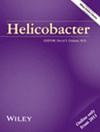Map-Like Redness Development After Eradication Therapy for Helicobacter pylori Infection: Prospective Multicenter Observational Study
Abstract
Background
Map-like redness, pathological intestinal metaplasia, is observed in one-fourth to one-third of patients 1 year after Helicobacter pylori eradication therapy, mainly in the corpus, and is a newly identified endoscopic risk factor for gastric cancer development after eradication. However, it is unclear whether intestinal metaplasia is present before eradication at the site where the map-like redness appears. We aimed to identify endoscopic findings that predict the occurrence of map-like redness before H. pylori eradication.
Materials and Methods
As a prospective multicenter trial, the characteristics of patients in whom map-like redness developed after eradication, and the association between the endoscopic severity of gastritis and the development of map-like redness in patients who underwent endoscopy before and 1-year after eradication were investigated.
Results
The rate of map-like redness in all 93 patients 1-year postsuccessful eradication was 30.1% (95% confidence interval [CI]: 21.0–40.5). All patients with map-like redness were endoscopically observed to have intestinal metaplasia before eradication, in the site that subsequently developed map-like redness. Patients who developed map-like redness were older, had more severe intestinal metaplasia and nodularity and a higher total score on the Kyoto Classification of Gastritis both before and after eradication than patients who did not. On multivariate analysis, map-like redness was found to be associated with posttreatment intestinal metaplasia (odds ratio: 8.144; 95% CI: 2.811–23.592).
Conclusions
In all patients who developed map-like redness after eradication, endoscopic intestinal metaplasia was observed at the site developed map-like redness before eradication therapy. Map-like redness was especially observed in patients with more severe intestinal metaplasia at 1-year after eradication. Such patients require increased attention at surveillance endoscopy, owing to generally having a higher risk of gastric cancer development.
Trial Registration
University Hospital Medical Information Network: UMIN000044707

 求助内容:
求助内容: 应助结果提醒方式:
应助结果提醒方式:


